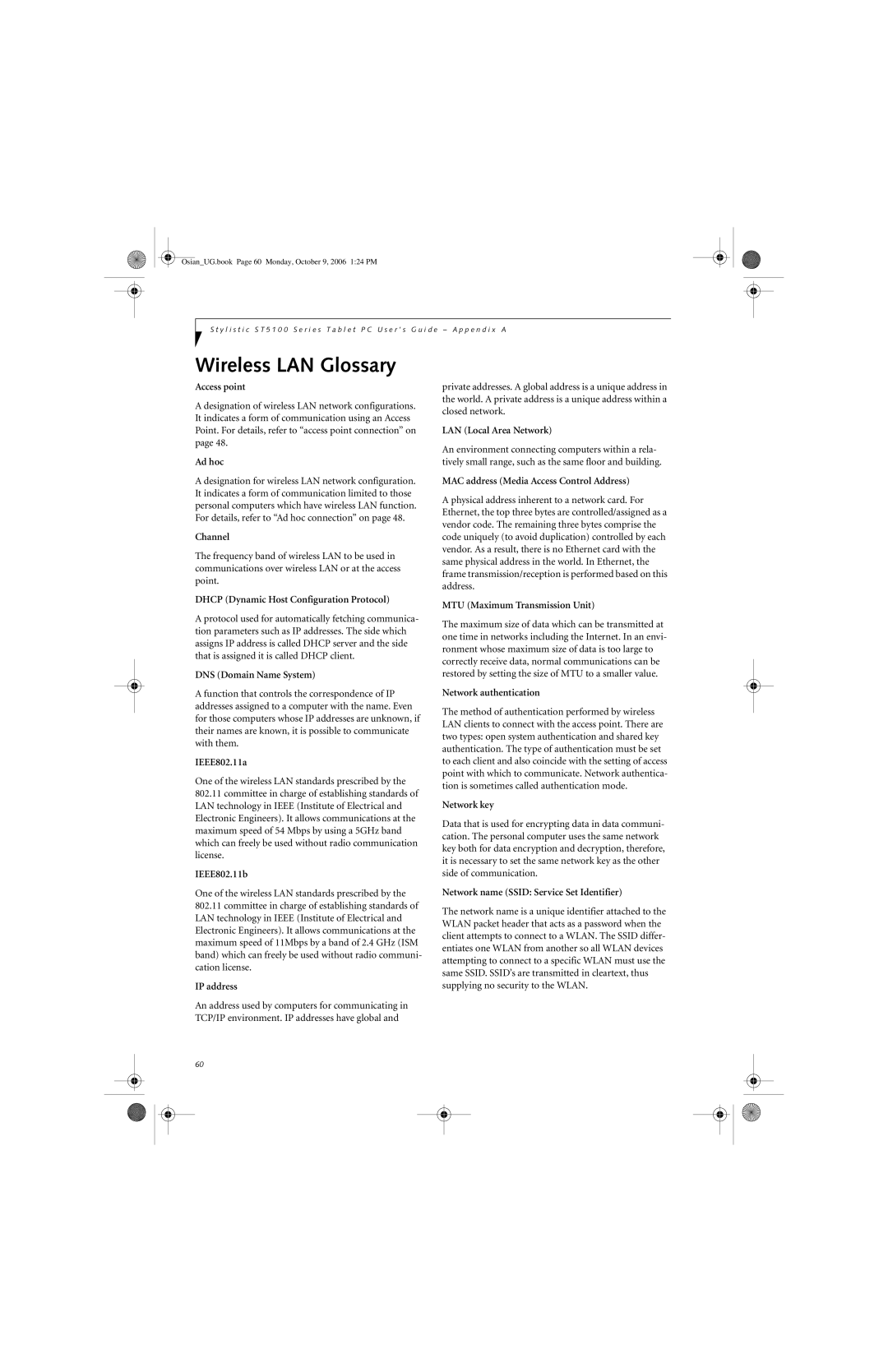
Osian_UG.book Page 60 Monday, October 9, 2006 1:24 PM
S t y l i s t i c S T 5 1 0 0 S e r i e s T a b l e t P C U s e r ’ s G u i d e – A p p e n d i x A
Wireless LAN Glossary
Access point
A designation of wireless LAN network configurations. It indicates a form of communication using an Access Point. For details, refer to “access point connection” on page 48.
Ad hoc
A designation for wireless LAN network configuration. It indicates a form of communication limited to those personal computers which have wireless LAN function. For details, refer to “Ad hoc connection” on page 48.
Channel
The frequency band of wireless LAN to be used in communications over wireless LAN or at the access point.
DHCP (Dynamic Host Configuration Protocol)
A protocol used for automatically fetching communica- tion parameters such as IP addresses. The side which assigns IP address is called DHCP server and the side that is assigned it is called DHCP client.
DNS (Domain Name System)
A function that controls the correspondence of IP addresses assigned to a computer with the name. Even for those computers whose IP addresses are unknown, if their names are known, it is possible to communicate with them.
IEEE802.11a
One of the wireless LAN standards prescribed by the
802.11committee in charge of establishing standards of LAN technology in IEEE (Institute of Electrical and Electronic Engineers). It allows communications at the maximum speed of 54 Mbps by using a 5GHz band which can freely be used without radio communication license.
IEEE802.11b
One of the wireless LAN standards prescribed by the
802.11committee in charge of establishing standards of LAN technology in IEEE (Institute of Electrical and Electronic Engineers). It allows communications at the maximum speed of 11Mbps by a band of 2.4 GHz (ISM band) which can freely be used without radio communi- cation license.
IP address
An address used by computers for communicating in TCP/IP environment. IP addresses have global and
private addresses. A global address is a unique address in the world. A private address is a unique address within a closed network.
LAN (Local Area Network)
An environment connecting computers within a rela- tively small range, such as the same floor and building.
MAC address (Media Access Control Address)
A physical address inherent to a network card. For Ethernet, the top three bytes are controlled/assigned as a vendor code. The remaining three bytes comprise the code uniquely (to avoid duplication) controlled by each vendor. As a result, there is no Ethernet card with the same physical address in the world. In Ethernet, the frame transmission/reception is performed based on this address.
MTU (Maximum Transmission Unit)
The maximum size of data which can be transmitted at one time in networks including the Internet. In an envi- ronment whose maximum size of data is too large to correctly receive data, normal communications can be restored by setting the size of MTU to a smaller value.
Network authentication
The method of authentication performed by wireless LAN clients to connect with the access point. There are two types: open system authentication and shared key authentication. The type of authentication must be set to each client and also coincide with the setting of access point with which to communicate. Network authentica- tion is sometimes called authentication mode.
Network key
Data that is used for encrypting data in data communi- cation. The personal computer uses the same network key both for data encryption and decryption, therefore, it is necessary to set the same network key as the other side of communication.
Network name (SSID: Service Set Identifier)
The network name is a unique identifier attached to the WLAN packet header that acts as a password when the client attempts to connect to a WLAN. The SSID differ- entiates one WLAN from another so all WLAN devices attempting to connect to a specific WLAN must use the same SSID. SSID’s are transmitted in cleartext, thus supplying no security to the WLAN.
60
